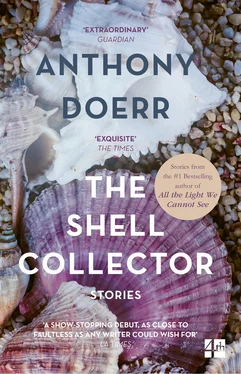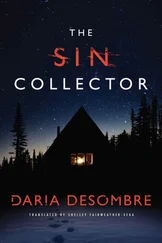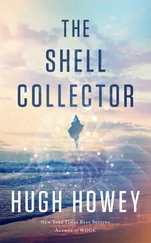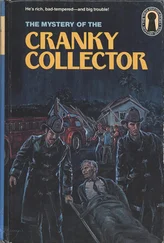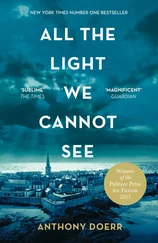The stars rolled up over him in their myriad shiverings. His life had made its final spiral, delving down into its darkest whorl, where shell tapered into shadow. What did he remember, as he faded, poisoned finally, into the tide? His wife, his father, Josh? Did his childhood scroll by first, like a film reel, a boy under the northern lights, clambering into his father’s Bell 47 helicopter? What was there, what was the hot, hard kernel of human experience at his center—a dreamy death in water, poison, disappearing, dissolution, the cold sight of his arctic origins or fifty years of blindness, the thunder of a caribou hunt, lashing bullets into the herd from the landing strut of a helicopter? Did he find faith, regret, a great sad balloon of emptiness in his gut, his unseen, unknown son, just one of Josh’s beautiful unanswered letters?
No. There was no time. The venom had spread to his chest. He remembered this: blue. He remembered how that morning one of the Jims had praised the blue body of a reef fish. “That blue ,” he’d said. The shell collector remembered seeing blue in ice fields, in Whitehorse, as a boy. Even now, fifty-five years later, after all his visual memories had waned, even in dreams—the look of the world and his own face long faded—he remembered how blue looked at the bottom pinch of a crevasse, cobalt and miraculous. He remembered kicking snow over the lip, tiny slivers disappearing into an icy cleft.
Then his body abandoned him. He felt himself dissolve into that most extravagantly vivid of places, into the clouds rising darkly at the horizon, the stars blazing in their lightless tracts, the trees sprouting up from the sand, the ebbing, living waters. What he must have felt, what awful, frigid loneliness.
The girl, Seema, the mwadhini’s daughter, found him in the morning. She was the one who had come, every week since her recovery, to stock his shelves with rice and dried beef, to bring him toilet paper and bread and what mail he had and Uhu milk in paper cartons. Rowing there from Lamu with her nine-year-old arms, out of sight of the island, of other boats, with only the mangroves to see, sometimes she would unpin her black wraparound and let the sun down on her shoulders, her neck, her hair.
She found him awash, faceup, on a stretch of white sand. He was a kilometer from his home. Tumaini was with him, curled around his chest, her fur sopped, whining softly.
He was barefoot; his left hand was badly swollen, the fingernails black. She took him up, his body that smelled so much like the sea, of the thousands of boiled gastropods he had tweezered from shells, and heaved him into her little boat. She fitted the oarlocks and rowed him to his kibanda. Tumaini raced alongside, bounding along the shore, pausing to let the boat catch up, yelping, galloping off again.
When they heard the girl and the dog come clattering up to the door, the Jims burst from their sleeping bags, their hair matted, eyes red, and helped in the best ways they knew. They carried the shell collector in and with the girl’s help radioed Dr. Kabiru. They wiped the shell collector’s face with a washcloth and listened to his heart beating shallowly and slowly. Twice he stopped breathing and twice one of those big writers put his mouth on the shell collector’s and blew life into his lungs.
He was numb forever. What clockless hours passed, what weeks and months? He didn’t know. He dreamed of glass, of miniature glassblowers making cone teeth like tiny snow-needles, like the thinnest bones of fish, vanes on the arms of a snowflake. He dreamed of the ocean glassed over with a thick sheet and him skating out on it, peering down at the reef, its changing, perilous sculpture, its vast, miniature kingdoms. All of it—the limp tentacles of a coral polyp, the chewed floating body of a clownfish—was gray and lonesome, torn down. A freezing wind rushed down his collar, and the clouds, stringy and ragged, poured past in a terrible hurry. He was the only living thing on the whole surface of the earth and there was nothing to meet, nothing to see, no ground to stand on.
Sometimes he woke to chai pouring into his mouth. He felt his body freeze it, ice chunks rattle through his guts. It was Seema who warmed him, finally. She visited every day, rowing from her father’s jumba to the shell collector’s kibanda, under the white sun, over the turquoise waters. She nursed him out of bed, shooed the siafu from his face, fed him toast. She began walking him outside and sitting with him in the sun. He shivered endlessly. She asked him about his life, about shells he had found and about the cone shell that saved her life. Eventually she began to hold his wrists and walk him out into the lagoon and he shivered whenever air touched his wet skin.
The shell collector was wading, feeling for shells with his toes. It had been a year since he’d been bitten.
Tumaini perched on a rock and sniffed at the horizon where a line of birds threaded along beneath stacks of cumulus. Seema was on the reef with them, as she had been nearly every day, her shoulders free of her wraparound. Her hair, usually bound back, hung across her neck and reflected the sun. What comfort it was to be with a person who could not see, who did not care anyway.
Seema watched as a school of fish, tiny and spear-shaped, flashed just below the surface of the water. They stared up at her with ten thousand round eyes, then turned lazily. Their shadows glided over the rutted sand, over a fern-shaped colony of coral. Those are needlefish, she thought, and that is Xenia soft coral. I know their names, how they rely on each other.
The shell collector moved a few meters, stopped and bent. He had come across what he thought was a bullia—a blind snail with a grooved, high-spired shell—and he kept his hand on it, two fingers resting lightly on the apex. After a long moment, waiting, tentative, the snail brought its foot from the aperture and resumed hauling itself over a ridge of sand. The shell collector, using his fingers, followed it for a while, then stood. “Beautiful,” he murmured. Beneath his feet the snail kept on, feeling its way forward, dragging the house of its shell, fitting its body to the sand, to the private unlit horizons that whorled all around it.
Конец ознакомительного фрагмента.
Текст предоставлен ООО «ЛитРес».
Прочитайте эту книгу целиком, купив полную легальную версию на ЛитРес.
Безопасно оплатить книгу можно банковской картой Visa, MasterCard, Maestro, со счета мобильного телефона, с платежного терминала, в салоне МТС или Связной, через PayPal, WebMoney, Яндекс.Деньги, QIWI Кошелек, бонусными картами или другим удобным Вам способом.
